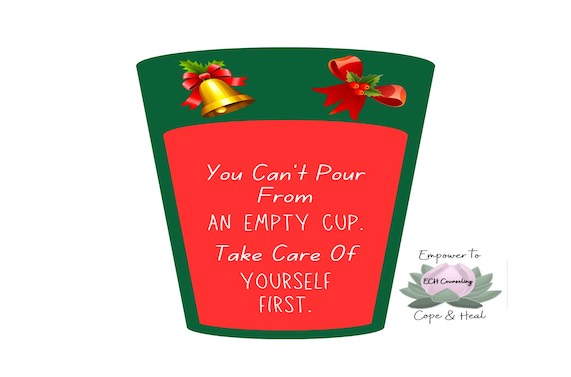
Written by Jennifer Cox LCPC
The holiday season is often a time of joy, celebration, and togetherness. However, for many individuals, it can also be a period of heightened stress, anxiety, and emotional challenges. Whether due to personal struggles, family dynamics, or the pressures of societal expectations, mental health during the holidays can take a toll. In this blog post, we’ll explore some common mental health challenges during the holiday season and provide practical tips for self-care and support.
Understanding the challenges can help empower you:
1. Increased Stress and Anxiety: The hustle and bustle of holiday preparations can lead to overwhelming feelings. From shopping for gifts to planning gatherings, the pressure to meet expectations can be daunting.
2. Loneliness and Isolation: For those who have lost loved ones, are far from family, or are experiencing relationship difficulties, the holidays can amplify feelings of loneliness. Traditions that once brought joy may now serve as painful reminders of what is missing.
3. Financial Strain: The cost of gifts, travel, and festivities can lead to financial stress, which can exacerbate anxiety, stress, and feelings of inadequacy.
4. Seasonal Affective Disorder (SAD): The shorter days and reduced sunlight can trigger depressive symptoms in some individuals, making it harder to find joy during what is traditionally seen as a happy time.
5. Unrealistic Expectations: Social media often portrays an idealized version of holiday celebrations, which can create pressure to meet those standards and lead to feelings of inadequacy.
Strategies for Self-Care:
1. Set Realistic Expectations: It’s essential to recognize that perfection is unattainable – Allow yourself to embrace imperfections and focus on what truly matters. Take breaks from social media to avoid the pressures of comparison – Instead, focus on your own experiences and celebrate your unique journey.
2. Create New Traditions: If past traditions are painful, consider creating new ones that reflect your current situation and bring joy. This could be as simple as trying a new recipe, volunteering, or engaging in activities that honor your loved ones.
3. Establish Boundaries: It’s okay to say no. Whether it’s declining an invitation to a gathering or setting limits on gift-giving, prioritize your mental well-being by defining your boundaries.
4. Practice Gratitude: Keeping a gratitude journal can also help shift your focus from what’s lacking to what you appreciate in your life.
5. Plan Ahead: Anticipate potential triggers and plan coping strategies in advance. This can help you feel more in control and prepared for challenging moments.
6. Stay Connected: If you’re feeling isolated, reach out to friends or family members. A simple phone call, video chat, or even a simple text can help foster connection. If you’re struggling, communicate your feelings with loved ones. Sharing your experiences can foster understanding and support.
7. Seek Professional Help: If feelings of sadness, anxiety, or stress become unmanageable, don’t hesitate to reach out to a mental health professional. Therapy can provide valuable support and coping strategies to navigate the holiday season.
The holiday season can be a complex tapestry of emotions. While it’s important to acknowledge the joy and celebration, it’s equally crucial to recognize the challenges that many face during this time. By prioritizing self-care, setting realistic expectations, and seeking support, you can navigate the holidays with greater ease. Embrace the season in a way that feels authentic and nurturing to you. Wishing you a peaceful and fulfilling holiday season!
By working together, we can create a world where mental health is valued and
all individuals have access to the care and resources they deserve.
Reach out today at info@echcounseling.com or 815-363-0864

